

Celine Dion talks pain and courage MY HEART WILL GO ON
YOU ARE NOT ALONE
SCARED OF SPIDERS?
THREE DADS TALKING










Celine Dion talks pain and courage MY HEART WILL GO ON
YOU ARE NOT ALONE
SCARED OF SPIDERS?
THREE DADS TALKING







As we head into the season of bright days and cosy nights, we look at ways to stay upbeat and connected.
It’s spooky season too. We talk to a therapist about how facing our phobias is the only true way to combat them. He should know, he’s afraid of spiders! (page 16).
We meet folk who have overcome major challenges to reach their goals.
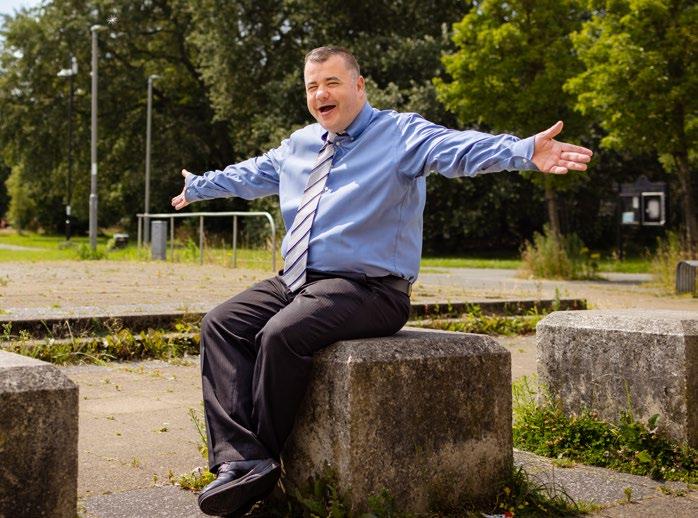
Volunteer Joe has overcome major obstacles to learn the digital skills needed to keep in touch with his brother (page 14).
Former lifeguard trainer Andy has worked tirelessly with health professionals to overcome the devastating effects of a stroke (page 32).
This is the season when loneliness might creep in. Research shows 16 to 34 year olds are the group most likely to become lonely. We talk to an expert about the difference between being alone and being lonely – and discover how to prevent loneliness (page 20).
Looking for a new indoor pastime to share with friends or meet like minded people? Pickleball has been around since the 60s but it’s now taking off in the UK and is great for all ages (page 30).
As part of our Black History Month celebrations we talked to a Ugandan born nurse and a Board member whose heritage is Caribbean to find out their thoughts on what has changed since last year – and whether they share the same hopes for the future (page 26).
We need to celebrate our rich culture...

Whatever your hopes and dreams, make autumn a time of fulfilment. Enjoy this issue,
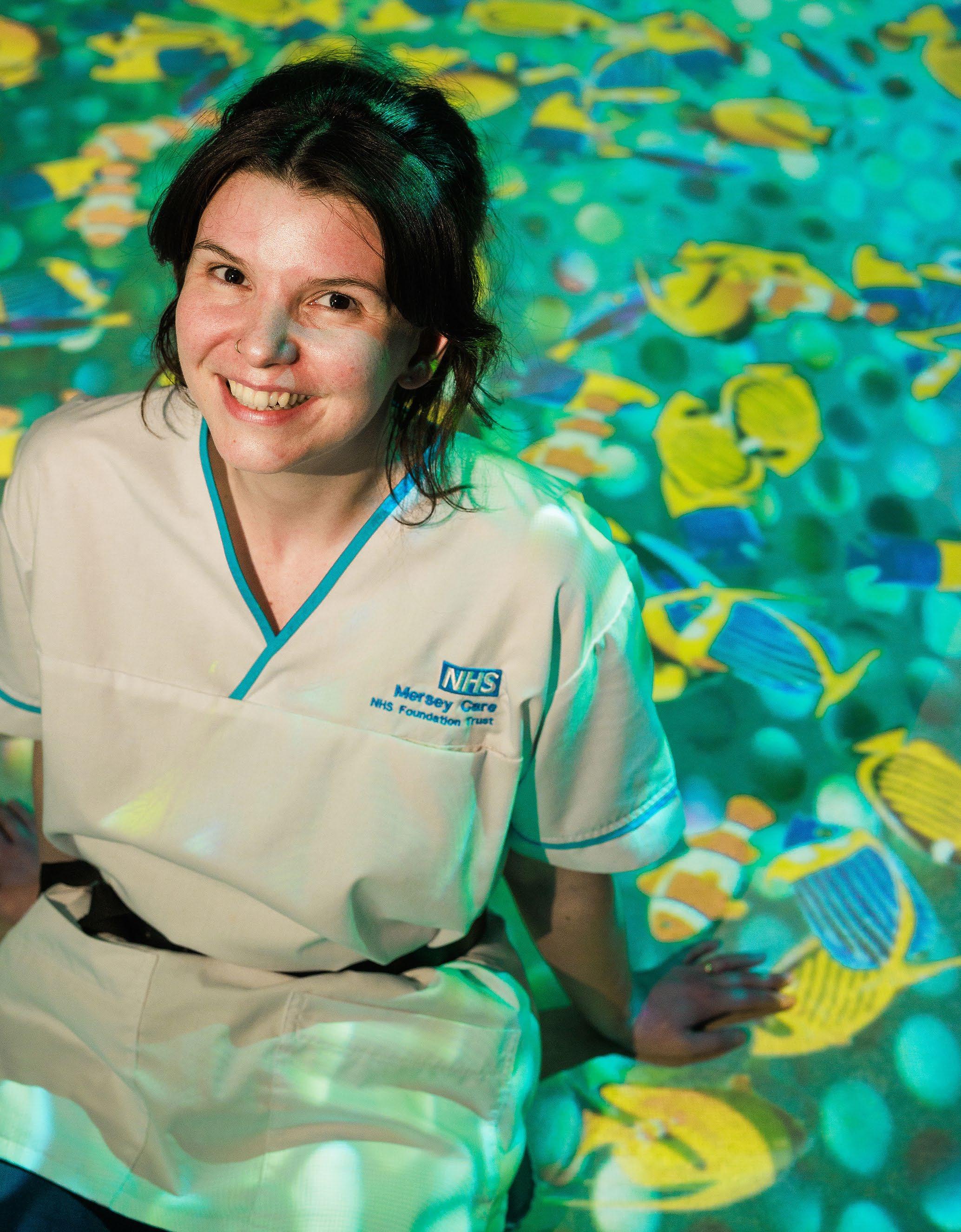
Swim in a tropical pool, listen to the waves from a palm filled beach. It’s virtually impossible. Or is it? Jo Fairclough plunges into the world of immersive therapy.
Speech and language therapist Rosie Murray (above and right) uses immersive treatment to help patients relax after intense therapy sessions.
Immersive technology was used in the recent Van Gogh Alive exhibition, where visitors found themselves in his famous wheat field. Starry skies and sunflowers mingle with music, voices and birdsong.

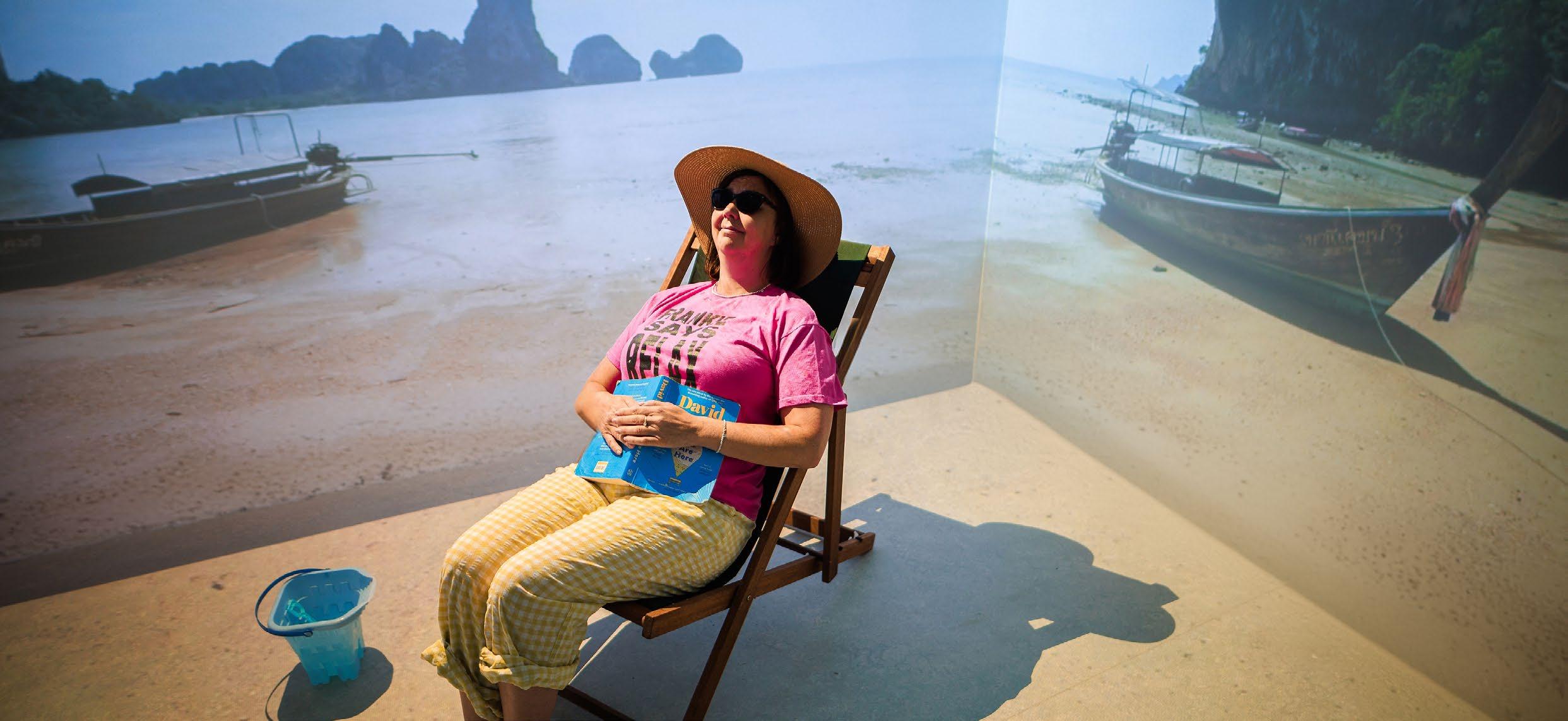
Jo Fairclough takes a virtual journey beyond reality to find inner peace.
Gentle waves are lapping near my feet. Golden sand stretches up towards a distant row of palm trees and blue skies. I relax into my beach chair, almost feeling the warmth of the Mediterranean sun on my face. Almost …
No suncream needed today though – I’m thousands of miles from this idyllic location. I’m not even outside.
This is what’s known as augmented reality. The picture postcard scene is actually a 360 degree video, projected onto all four walls and the floor of a box shaped room at Aspen Wood, a low secure hospital for people with learning disabilities. The waves are a soundtrack - yet the relaxation is real.
Investment in immersive technology is taking people with mental health issues to ‘places’ where they can relax and be more open to their treatment. It’s invaluable for patients who may not respond to traditional therapies. More are asking to be immersed in a forest or at the edge of a river for their treatment session.
Clinical Director for Older Adult Services, Aravind Komuravelli, is clear how much difference this futuristic treatment is making.
“This type of therapy is incredibly effective in reducing anxiety. Its ability to evoke happy memories is especially effective for patients with dementia.”
“We see smiles of sheer delight all the time. It’s a joy to see people benefitting so much.”
“With the click of a switch, someone who loved going to a football match, for example, can be transported back amongst the crowd, cheering and singing. We see smiles of sheer delight all the time. It’s a joy to see people benefitting so much.”

I relax into my beach chair, almost feeling the warmth of the Mediterranean sun on my face.
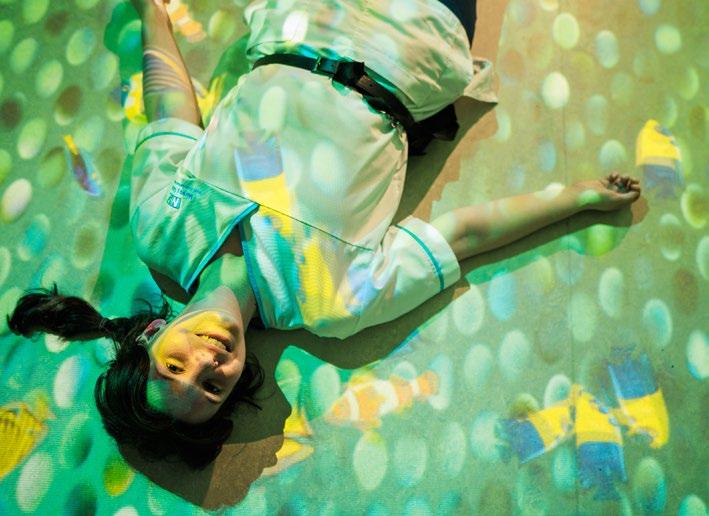
It’s not all sunshine and mindfulness. Patients with a fear of the dentist can have a virtual appointment to help them prepare for a real life appointment in an actual dental clinic. After long periods in hospital, simple things like crowded cafés, supermarkets and busy roads can be scary. All can be recreated here. In the safety of the immersion room, a therapist can start to look at what triggers someone’s fear and find solutions.
Lead speech and language therapist Rosie Murray supports patients who struggle to make sense of the world around them. “After an intense therapy session they can use the room to release stress, so they go back to the ward feeling relaxed and positive. It’s amazing how sitting on a beach can make you feel better –even if it isn’t real.” I couldn’t agree more.
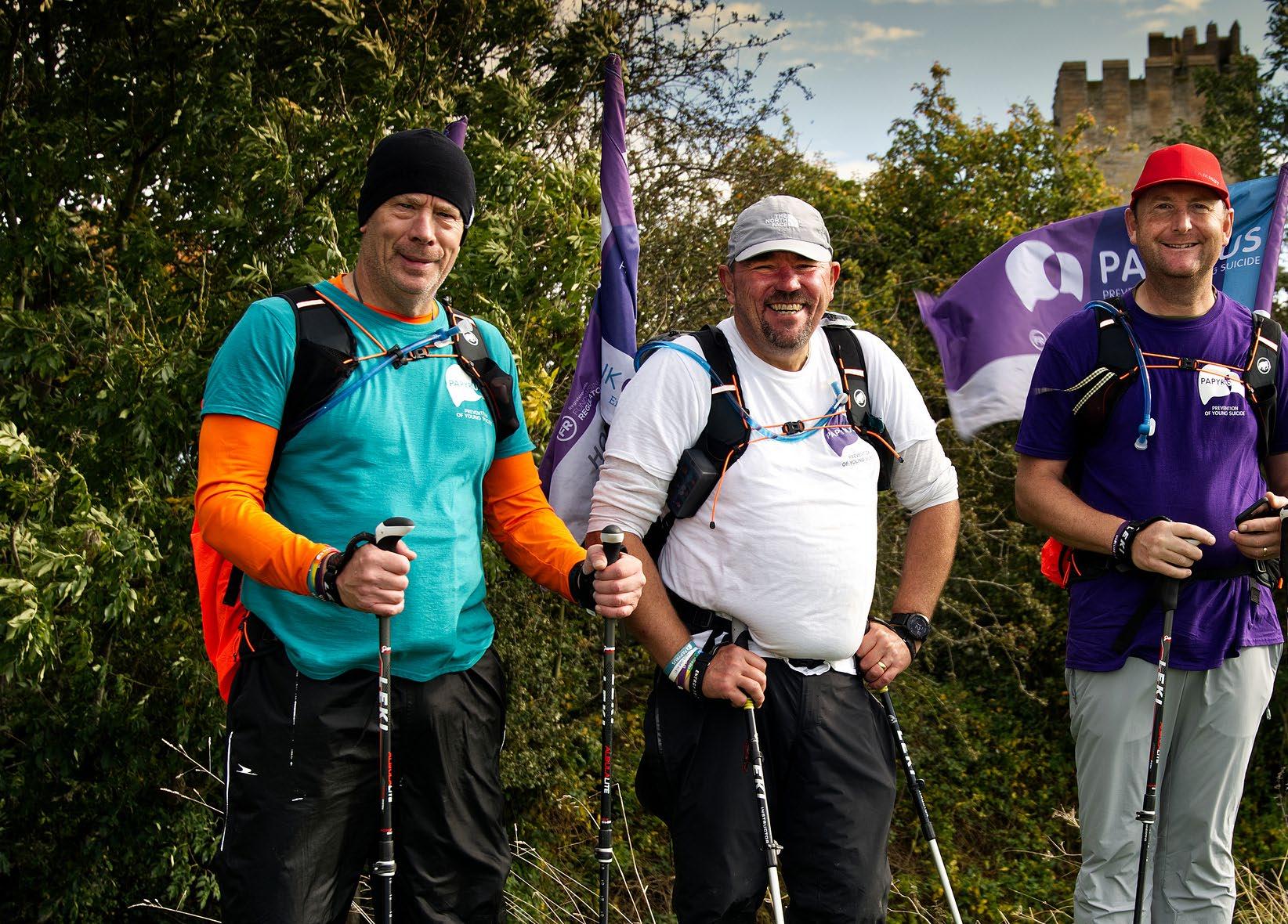
3 Dads Walking made the world look up when they trekked across the country in memory of their daughters who died by suicide.
Mike Palmer, Andy Airey and Tim Owen walked 500 miles in 25 days to raise funds and awareness. They were each awarded an MBE and are now lobbying Parliament and working with academics on a schools and families suicide prevention programme.
Mike and Andy spoke exclusively to MC Magazine at the Zero Suicide International Summit in Liverpool about how despair turned into determination – and their mission to educate children about suicide prevention.
MC: Suicides are at their highest rates for a decade. Why are we still not talking about it?
Mike: People think it’ll never touch them. I was the same, I never thought I’d lose my youngest daughter to suicide. I was blissfully ignorant even though there were signs that she wasn’t happy. If I’d had awareness through training, there’s a chance Beth would still be here.
Why did you choose to walk?
Mike: I felt I had to fight something, Tim’s the same. Andy had already started doing runs when we met - but I can’t run so we cut it down to walking! We’re not athletes but we do talk openly and that made people listen. The first walk was extraordinary. The kindness people showed was incredible.
Andy: We knew we wanted to do something positive, but we couldn’t have imagined the impact. Having a tracker meant we rarely walked alone. Haylis Smith, the Scottish delivery lead for suicide prevention, walked with us through Coldstream. By the end she was in tears saying she’d never seen anything like it.
Did putting yourselves out there make you grieve more?
Andy: Grief by suicide is exquisitely painful, but we’re the sort of family who wanted to talk openly. As we did that we realised suicide was touching people we knew who had never spoken out. On the walks we’ve met people who had kept the secret for decades.
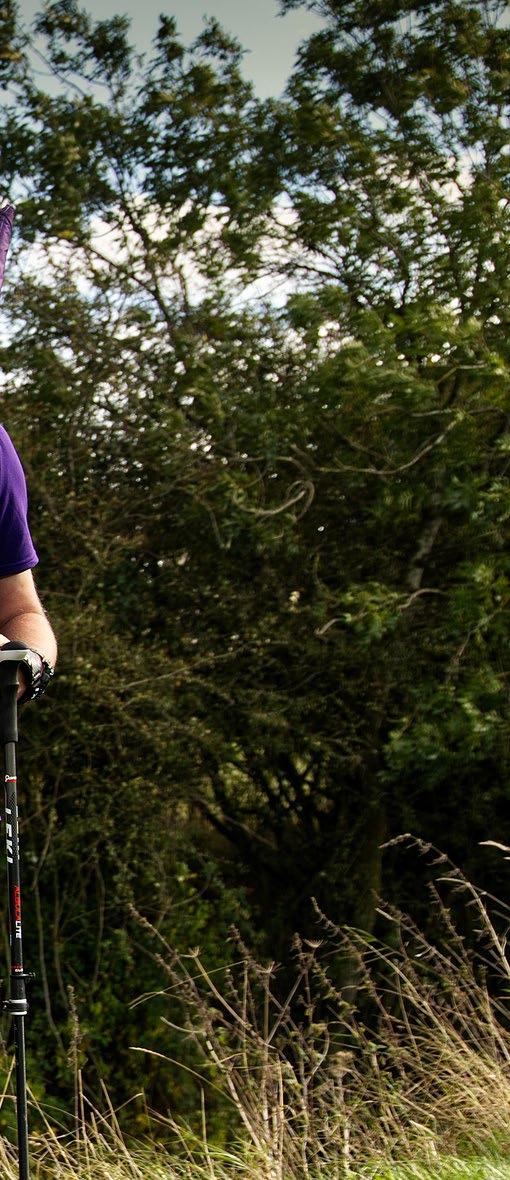
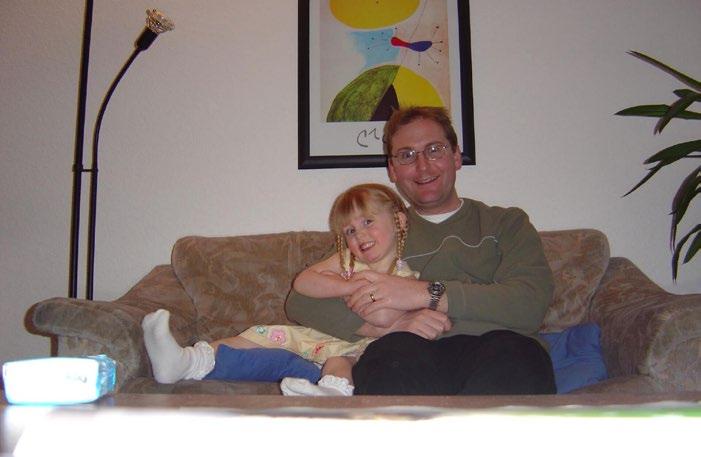
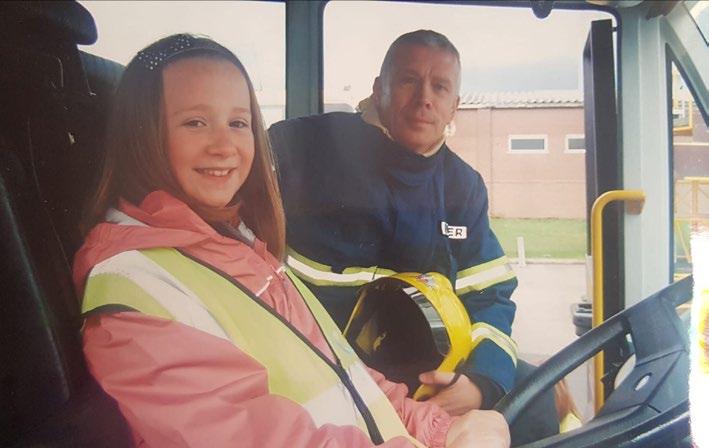

“We knew we wanted to do something positive, but we couldn’t have imagined the impact.”
How has it changed you?
Mike: I have a purpose nowmaking sure my family is ok and this. There’s not a day goes by that we’re not all in contact with one another. We’re living this. It gives me a reason to get up. But we’re not a morbid parade, we’re positive and that engages people to ask questions.
“The first walk was extraordinary. The kindness people showed was incredible.”
Suicide is a challenging word. Does saying it ever get any easier to say?
Andy: We say it so many times we’re used to it but we’re aware of the impact on an audience. The language needs to change. We’ve told politicians, journalists – the word ‘commit’ is wrong. People die by suicide; they take their own life, but suicide isn’t a criminal offence.
What do you hope to see?
Mike: It’s so obvious to us that we need to go right upstream and invest in our children now. Schools are places of stress and anxiety. Parents are doing what we did, living in ignorance. Other countries have a budget for mental health education. Here, mental health leads in schools have two days training and suicide is not mentioned once. Liverpool John Moores University is developing a suicide prevention programme in schools, we need that to move forward but there’s so much more to do.
What frustrates you?
Andy: We support the new draft relationships, sex and health curriculum and we’re pleased the words ‘suicide prevention’ have appeared for the first time. But it’s still not listed as compuIsory – changing it would give us permission to talk to our young people. The curriculum says direct references to suicide should not be made before Year 8 – that’s a year too late. From our conversations with suicide bereaved 11 and 12 year olds we know that we should be speaking openly and age
appropriately to Year 7s about suicide prevention. We need to give them the skills to get help when they need it.
Why did you choose Papyrus?
Andy: I was introduced to Papyrus soon after Sophie died and found that suicide is the biggest killer of under 35s in the country. I couldn’t believe it. I needed to do something to help them reach more young people.
What drives you?
Andy: Getting to a point where no one goes through what we did. The day Sophie died I’d pocket dialled her. We had a silly conversation where she laughed at me for being a daft old dad. We found out later she was on her way to take her own life. If she’d had the means to say ‘Help me’ there might have been a chance.”
To donate £10 text 3DADS to 70085, or to find out more visit: 3dadswalking.uk
Papyrus 24/7 Hopeline 0800 068 41 41 Papyrus-uk.org
Zero Suicide Alliance: zerosuicidealliance.com

Our FREE online training courses teach you the skills and confidence to have a potentially life saving conversation with someone you’re worried about.
Take the training zerosuicidealliance.com

Fishing is proven to help combat anxiety and depression. We hooked up with two anglers to find out more.
To onlookers it’s just friends on a fishing trip. To Ryan Sharples it’s a lifeline.
four years ago, Ryan was working long hours, hardly sleeping and cut off from friends and family. He began hearing voices and was diagnosed with Post Traumatic Stress Disorder and psychosis.
He’s not alone. Mental health issues often stem from other causes such as loneliness and isolation, issues which the NHS can’t solve alone.
The fishing project comes from a pioneering partnership* between Mersey Care and Sean’s Place, a charity offering social and therapeutic support to men in Sefton. Staff work alongside community mental health teams so patients coming to the end of their treatment receive the social support they need to help them recover.
Ryan Sharples (left on main pic) says fishing has helped with his recovery.
“I found it hard to come to terms that I had a mental health condition and that I needed help. Being in a new situation with the fear of judgement would normally bring on my psychosis, but within minutes of being at Sean’s Place I felt welcome.
It’s changed my mindset and my self esteem. I have pride. I can take on new things, but just being able to come in and chat over coffee is amazing.
I’ve made friends for life and seen a change in myself. It only takes one step in the right direction to get yourself back on track.”
Becky Taylor, Mersey Care’s Head of Operations for Community Mental Health, explains. “The NHS can treat someone for a mental health issue, but if we want them to stay well afterwards we have to also help them tackle issues that aren’t medical, like cost of living, loneliness or isolation. Without this kind of social support, people will struggle more to recover.”
“People can choose what activities they want to join in with. There’s something for everyone and we’re here for them as long as they need us to be. “
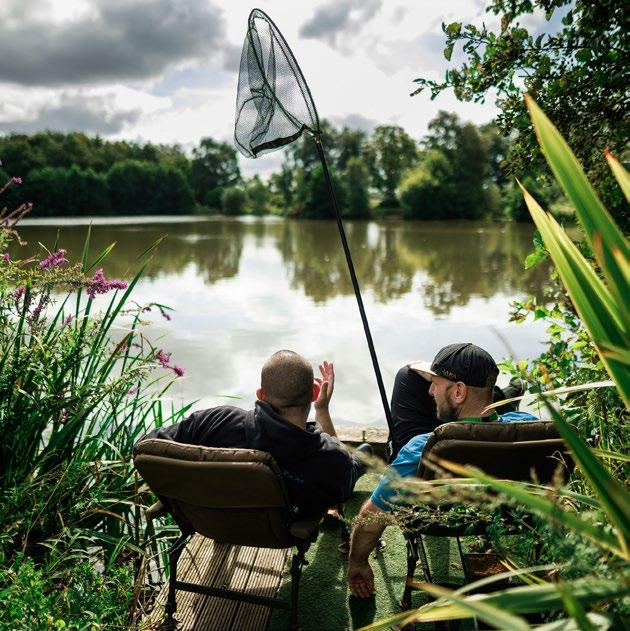
Research by Anglia Ruskin University revealed that ‘Individuals who fish have lower levels of diagnosed anxiety disorder, suicide attempts and instances of deliberate self harm compared to those who did not fish.’
“Through our partnerships people get a chance to build friendships or try new activities. It can make such a difference to someone, helping them to develop skills to get well and stay well.”
Sean’s Place was set up by Debbie Rogers as testament to her brother Sean, who died by suicide in 2019. She says the partnership means they can support a man for as long as he needs.
“We’re here to support men who might be coming to the end of their clinical treatment so we can continue supporting them to make the change less daunting.”
Fishing is on a long list of activities, but men can call in for a coffee and a chat at any time.
“There’s no ‘one size fits all’ approach here,” says Debbie. “People can choose what activities they want to join in with. There’s something for everyone and we’re here for them as long as they need us to be.”
*The partnership is part of Mersey Care’s Community Mental Health Transformation Programme.
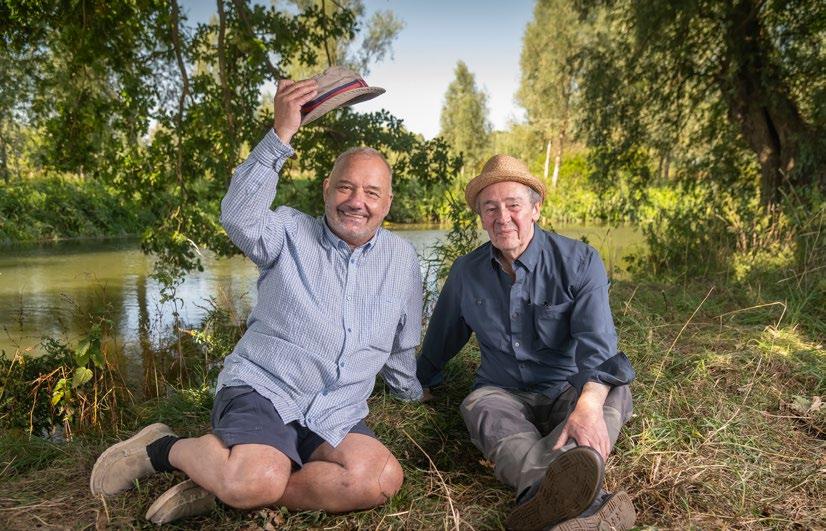
Apparently nearly two million of us watch each episode of Mortimer & Whitehouse: Gone Fishing, the BBC2 series where the comedians Bob and Paul bond through fishing. They say the experience has helped their recovery from heart problems.
Photo: BBC.
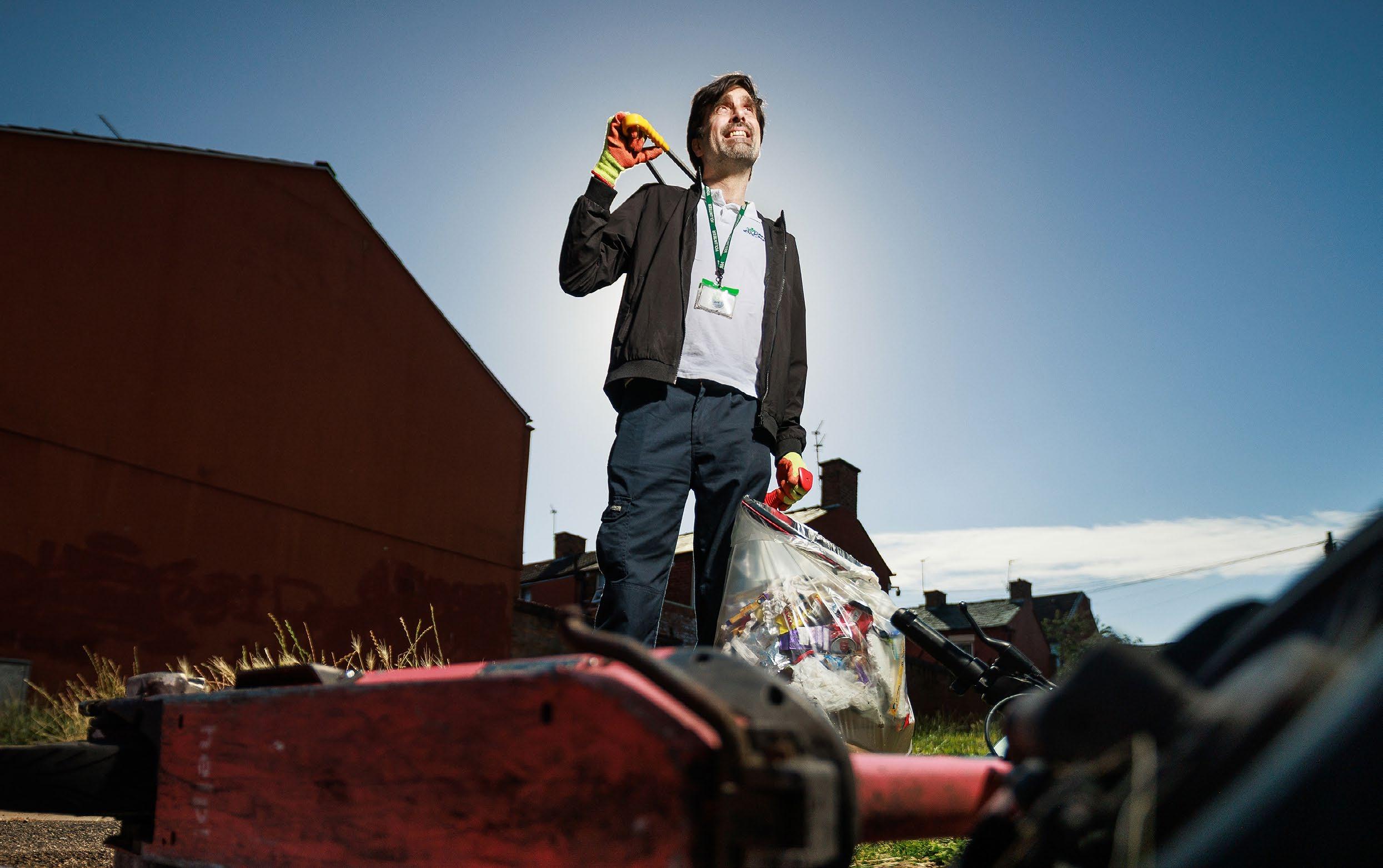
If you want to meet new people and help save the planet – join the litter pickers. We talk to a man whose passion for sustainability has brought some unexpected surprises.
Zoran Blackie picked up an empty crisp packet during a litter picking expedition –and was shocked.
“It was 20 years old,” he sighs. “It had been under a hedge for all that time, yet it hadn’t broken down.”
It’s a relic alright – but it’s not good news for the planet. The Wildlife Trusts says plastic poses the biggest threat to wildlife. Litter picking creates a better space for them and us.
Zoran (above), started picking up litter during the COVID pandemic.
“I noticed the increase on my own street. I care about my community and I wanted to do something proactive so I joined the Litter Clear Volunteers.”
Every Wednesday, come rain or shine he joins group members for a litter picking session and is also involved in other local community events.
“There are people from all walks of life. I’ve litter picked with a city councillor and a young family – we come together for a common cause.”
Zoran is looking for more ways the group can reuse and turn litter into something useful.
“We already sell cannisters for scrap to help fund the group. There’s a gentleman who turns plastic bottle tops into coasters and another who recycles and repurposes batteries from vapes.”
Are we just shifting the blame and responsibility? Zoran is clear. “Litter picking isn’t about blame – it’s taking pride in your community by showing respect. We can all do our bit by picking up litter we spot and putting it in the bin.”
Get involved in a litter picking group near you by contacting your local authority. For Liverpool, visit www.keepliverpooltidy.com
The Keep Britain Tidy website also has more information (see right).
Zoran Blackie is a Mersey Care Green Champion. Staff are encouraged to share their thoughts, ideas and questions. For more go to: merseycare.nhs.uk and search sustainability.
In 1954 the National Federation of Women’s Institutes passed a resolution to “Keep Britain Tidy.” The rest, as they say, is history.
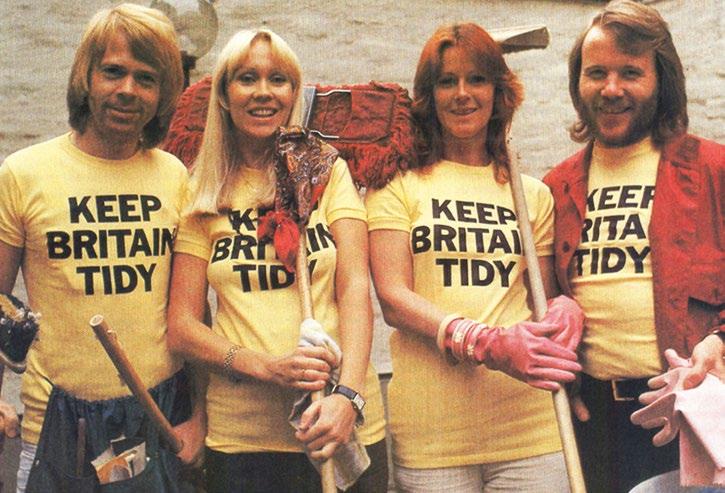

Uncle Bulgaria and his Womble friends were probably the most famous litter pickers of all.

Blue and Green Flags now celebrate the country’s best beaches and green spaces. Flags now proudly fly over 68 beaches and almost 1,800 parks.
Find out more at keepbritaintidy.org
Photos: keepbritaintidy.org

tips
• Be prepared: carry gardening gloves or a litter picker if you have one and a bag to dispose of anything you pick up
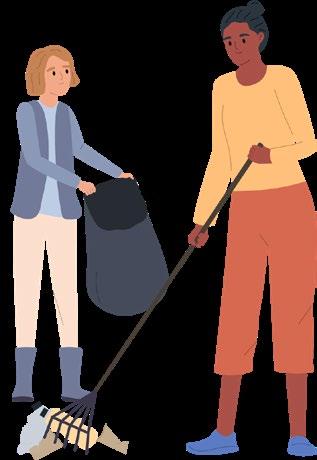
• If you're not sure what it is, don't pick it up
• Take extra care when picking up anything sharp
• Report dangerous or dumped electrical items or paint to the local council or landowner
• If you come across a fly tipping site or a dead animal, report it to your local authority
• Wash your hands properly after picking litter.
Source: Wildlife Trusts: wildlifetrusts.org
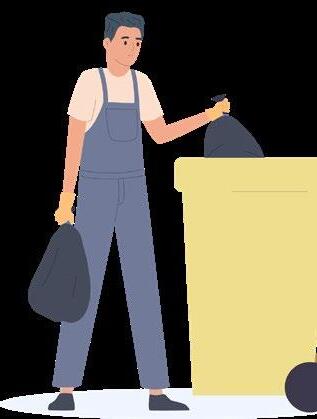
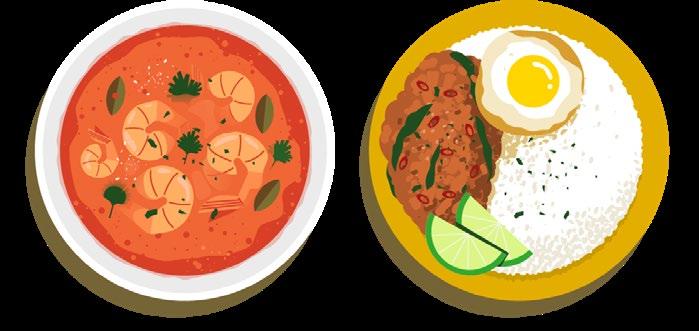


Love Food Hate Waste website offers ideas and recipes so you use every morsel of food that you buy or grow: lovefoodhatewaste.com

It could be straight out of a horror movie. But as a specialist tissue viability nurse, Katy sees the ‘massive’ benefits of larval therapy –using maggots to clean wounds.
Katy and the Skin Care Team support people whose wounds are proving hard to heal. “A wound can’t heal while there’s dead and decaying flesh or infection, so we need to remove it. We can use traditional methods, but it can take weeks for the wound to become completely clean. Maggots can do the job in days.”
How maggots are saving lives
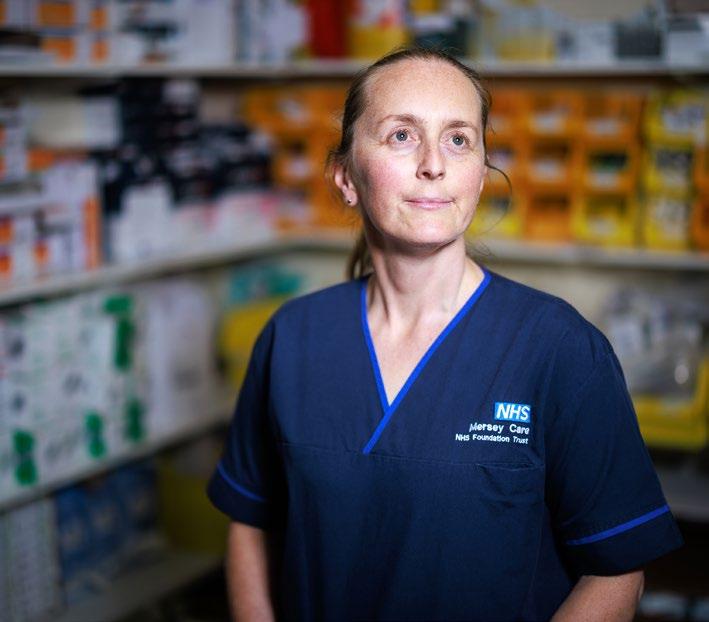
How does it work? “The larvae eat the dead flesh but leave healthy tissue alone,” says Katy. “When we put the bag into the wound, they’re almost invisible but when they come out four days later, they’ve grown quite a lot!”
Is it always a success? “It rarely fails unless the maggots become dehydrated, drown or suffocate because of a lack of oxygen, so we look after them well while they’re in the wound.”
How do people respond to the idea? “They’re sometimes nervous but most are desperate to get back to normal life so they’ll give it a go.
“The question everyone asks is, ‘Will I feel them moving around?’ It’s the ‘yuck’ factor.”
Some people do feel them, others don’t. We try to help the person see the sensation as a sign that the treatment is working. It’s great to see a wound that wouldn’t heal suddenly responding. It means so much to the person – it’s a huge step closer to regaining their life.”
Ray (pictured with his wife Ann), is looking forward to driving again after successful maggot therapy.
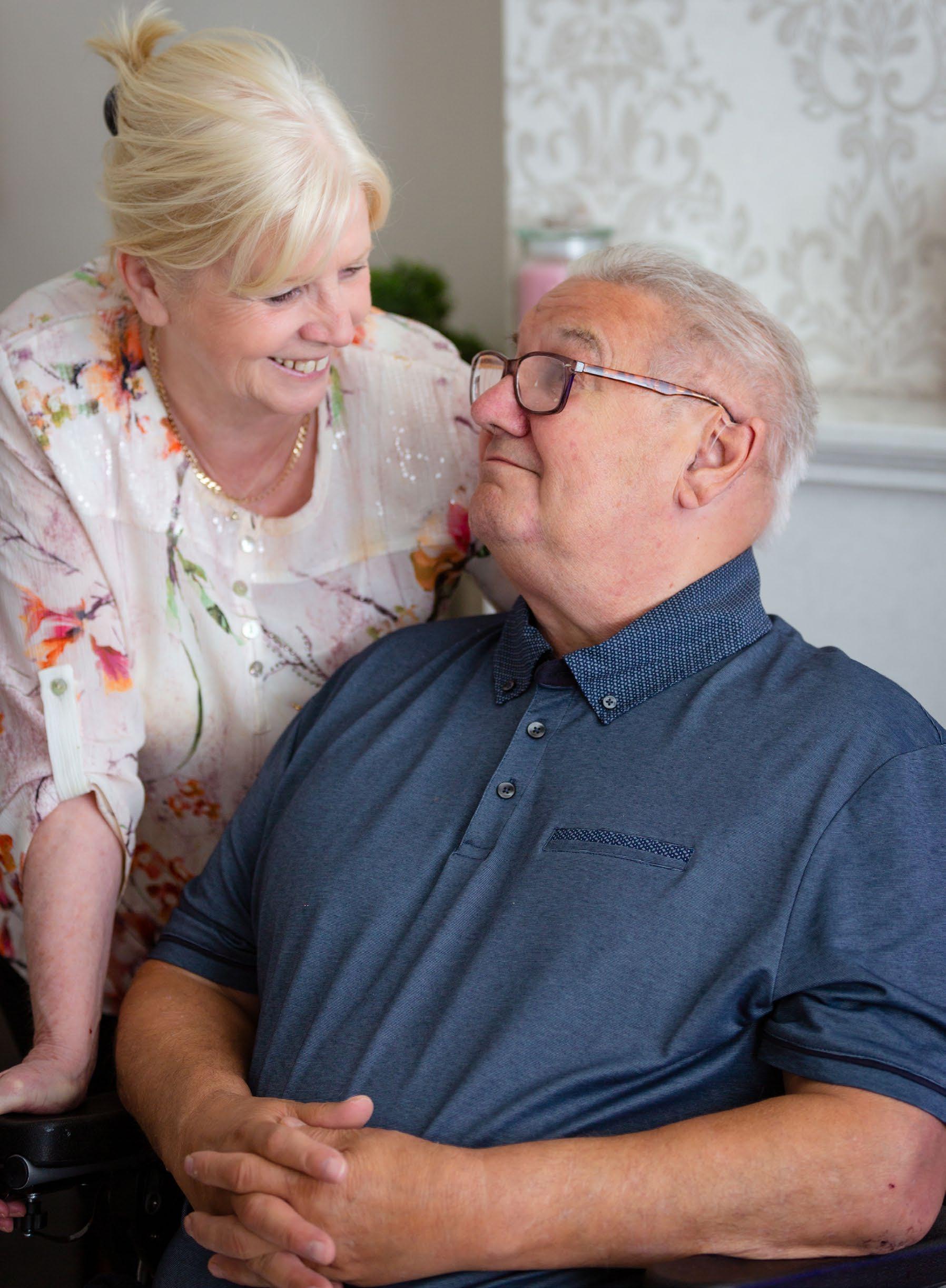
Ray is diabetic. He recently had amputations on both his legs and welcomed the maggot treatment so he can take pressure from his wife Ann and start driving again.
“For a long time I wore the wrong shoes, not realising my feet were being damaged. My toes went black, I was in a lot of pain. When they told me I’d need to have both legs amputated I was in shock.
“After the operation I wouldn’t look down – I was in denial.”
“In hospital I didn’t think I was going to pull through. But once I came home and the skin nurses came, there was a different vibe, they encouraged me. They told me how quickly the maggots work
Maggot trivia
Maggots have been used all over the world for centuries, including on battlefields. They went out of fashion as a treatment because they couldn’t be sterilised, so risked infection. This was the advent of antibiotics - but maggots produce natural antibiotics that bacteria don’t become resistant to.
Maggots are natural healers.
The larvae used today are specially bred from green bottle flies in laboratories, using eggs which have been treated to remove bacteria.
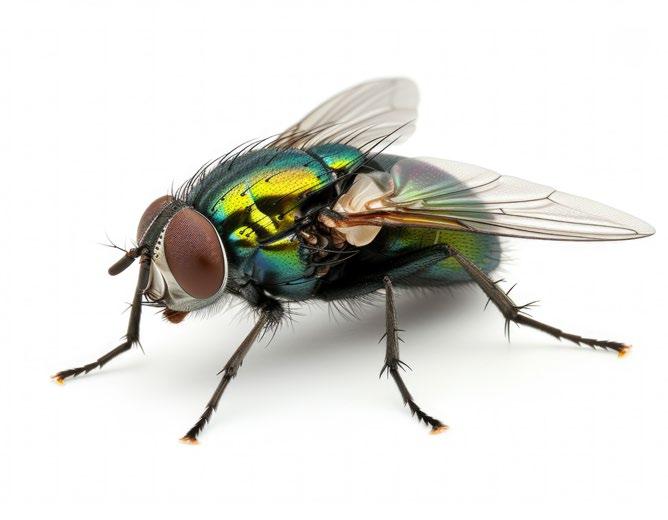
The green bottle fly provides the maggots that heal people.
to get rid of the dead stuff and let the wound heal. I started to feel positive again.
“Having maggots in my legs didn’t bother me, I knew they were doing a job. Katy and the team have made me more determined than ever to get back to as much normality as I can. I’ve been married 44 years and my wife has had to do a lot. I want to get back to driving so the maggots are helping me to do that.”

Student Joe Moore is beaming after The Life Rooms helped him discover a whole new digital world.
Joe’s love of his community is wonderful

Joe Moore enjoyed a holiday in Blackpool so much he sent a complimentary email to the hotel where he stayed. Nothing unusual in that, except Joe is unable to read or write and has never used a keyboard.
The 46 year old has learning challenges and is autistic, yet his determination to learn digital skills are matched only by his zest for life.
The Life Rooms Digital Health Advisor, Rachael Percival supported Joe through an online learning programme at The Life Rooms Lee Valley in Belle Vale.
“I’ve watched Joe work hard and overcome obstacles. He’s grown not just in skills but in confidence. He types postcards to his friends and family, makes photos and videos and follows his beloved Everton Football Club online.”
Joe is a much loved character, not least because of his beaming smile and quick wit. His MC Magazine interview at Lee Valley Millenium Centre was paused several times as people came up to shake his hand and say hello.
“Joe’s love of his community is wonderful,” said Rachael. “He fundraises for charity, volunteers in the Millennium Café, at story and rhyme time in the library and
with pensioner groups – and that’s alongside working at McDonald’s and studying with The Life Rooms. He brings joy to everyone with his dry humour, banter and words of wisdom.”
Joe’s response to the compliments? A huge grin. “I was nervous, I’d never written in my life and I wanted to write letters to people,” he says.
“They got me typing and now I talk to my brother on WhatSApp and I take photos. It’s a miracle.”
Joe took part in The Life Rooms’ Digital Inclusion Initiative, part of a wider digital skills programme. People who sign up receive a free android tablet, six months of free data and a 90 minute digital skills session. Call 0151 478 6556 (Walton) or 0151 472 4099 (Lee Valley) or visit: liferooms.org to find out more.
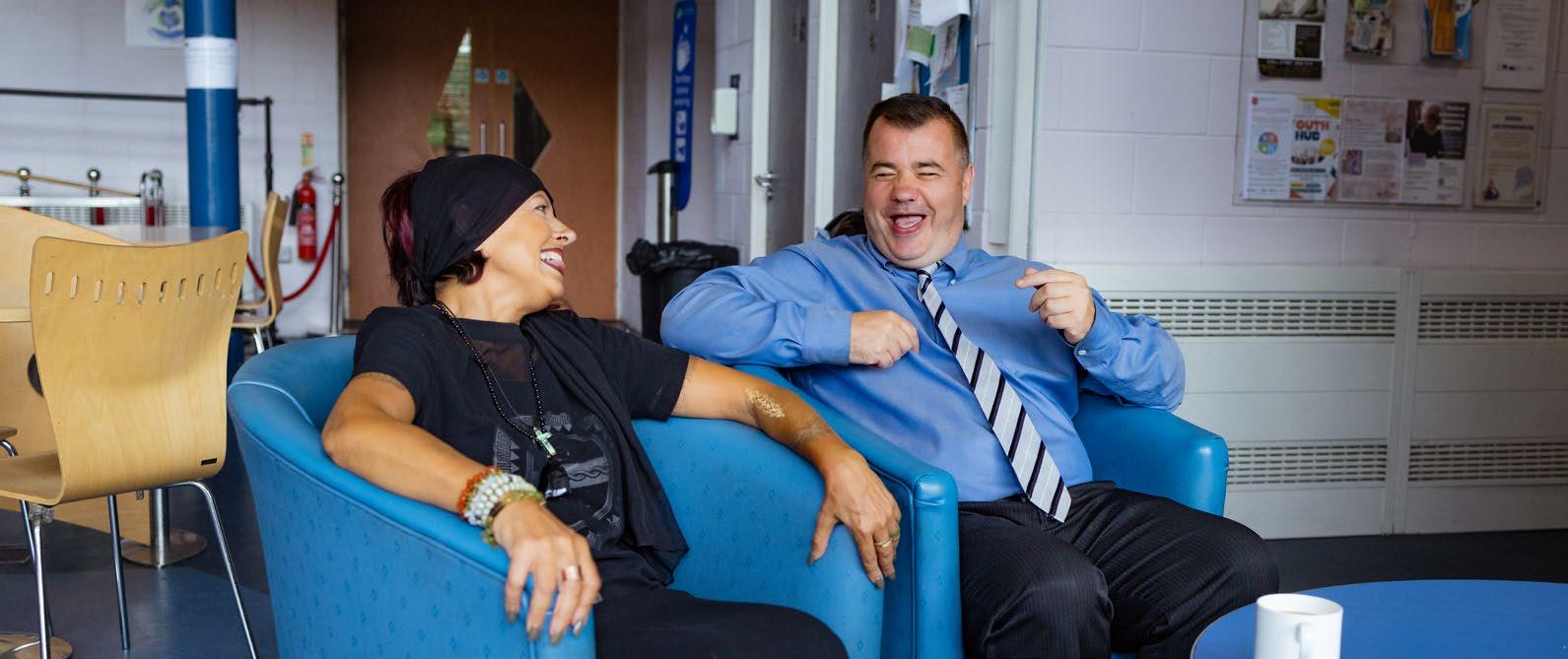
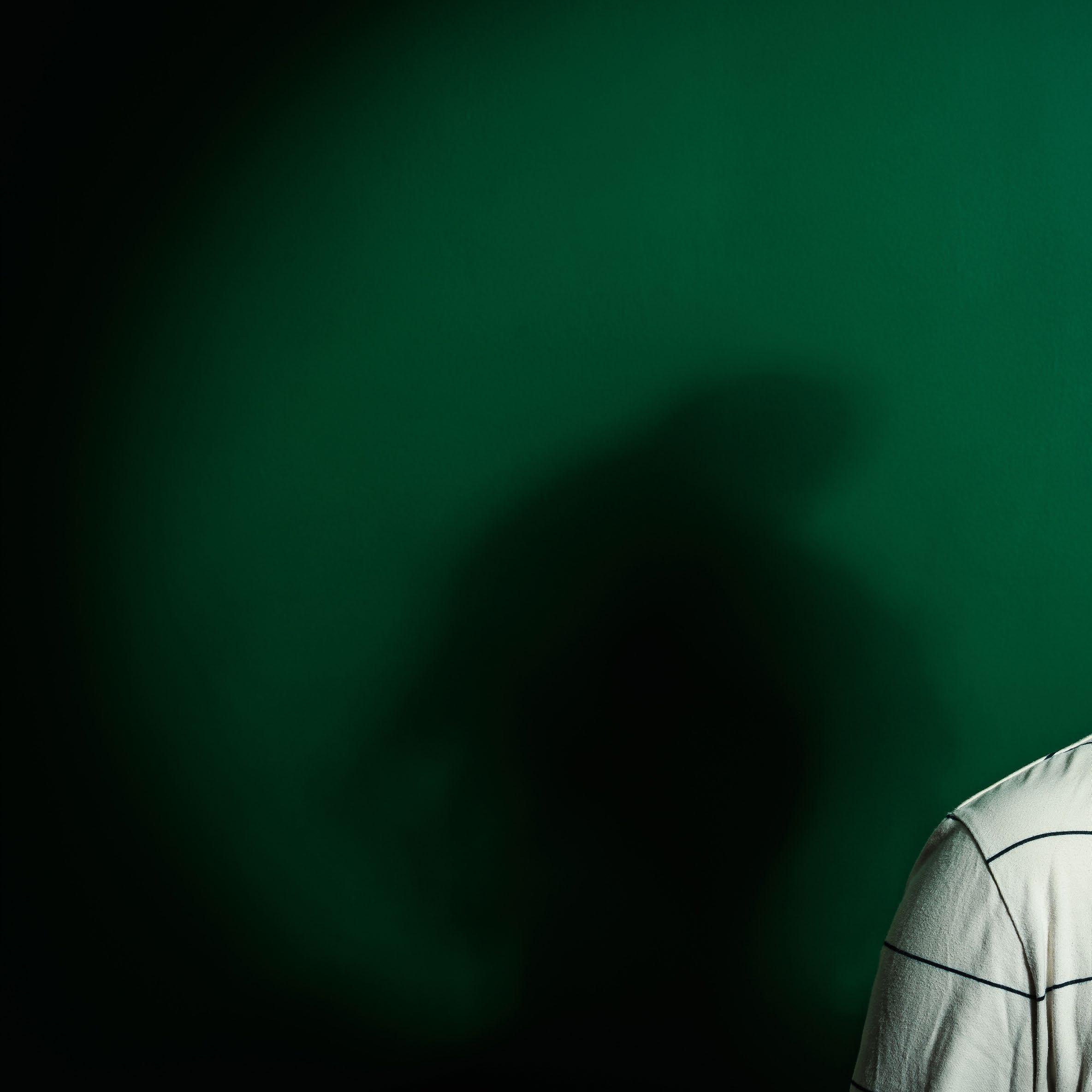
Spooky season is just round the corner. But while some people enjoy shivers, others get the heebie jeebies. An expert explains our fears and phobias.

Why are some of us so easily spooked? Huw Smith, high intensity therapist (above and left), explains how being scared affects us – and reveals his own irrational fear.
“Our fight or flight response kicks in when we feel like we’re in danger.”

”For me it’s spiders. When I was seven, I was playing a computer game with my big brother and a spider jumped out on the screen. I couldn’t run out of the room fast enough and now they freak me out!”
Problems arise when a fear becomes a phobia. Huw, who works for Mersey Care’s Talking Therapies service, explains.
“A phobia is an extreme form of anxiety where our brain overestimates a threat. The person avoids the situation or object that causes them to be anxious to the point where it severely affects their life.”
Huw says phobias often become unmanageable when a situation changes. He explains, “If you’re afraid of dogs and your neighbour
gets a dog, that fear could become a phobia.
The good news is that phobias are treatable.
“A phobia is a learned response, so we can unlearn them. As therapists we try to help the person build up a bank of experiences that directly contradict their perceived threat.”
Therapy uses a gradual approach. “Compare it to preparing for a marathon when you’ve never done any running - you need to build up slowly. If someone had a phobia of dogs for example, we’d start by showing them pictures of dogs and allow them to feel the anxiety. Eventually that anxiety would hit a peak and gradually reduce.
“We continue the process, building up tolerance until the person feels less threatened. Our goal is for the person to feel ok being in a room with a dog. It does work – one client who had lived with a phobia of dogs for years has since adopted her own!”
Talking Therapies services offer free NHS therapy to help you change the way you feel by changing the way you think. Visit: www.merseycare.nhs.uk/ talking-therapies
Celine Dion’s triumph amid her battle for health

Stiff Person Syndrome (SPS) is a rare neurological disorder causing severe muscle stiffness and spasms, mostly in the trunk and limbs. Believed to be autoimmune, it leads to difficulties in movement and daily activities. Treatment includes medications and physical therapy to manage symptoms and improve quality of life.

Millions witnessed Celine Dion’s stirring rendition of Édith Piaf’s ‘Hymn to Love’ from the rain soaked shoulders of the Eiffel Tower during the opening ceremony of the Olympic Games in Paris this summer.
Piaf’s composition was a response to loss and hurt making it a poignant choice for the Canadian diva who is battling with Stiff Person Syndrome, a rare and painful neurological disorder.
SPS is often characterised by debilitating muscle spasms. Dion talks of crushing rib pain on a par with broken bones and throat spasms that resemble being strangled.
“It’s like someone is pushing your larynx, but it can also be in the abdominal area, in the spine, in the ribs and cramps in your hands where you cannot unlock them.”
The film I Am: Celine Dion, which chronicles the singer’s extraordinary career and her recent health struggles, is reported to be Amazon’s most popular documentary ever.
Dion told French Vogue that despite feelings of depression she did not want to give in to her condition.
“At the beginning I would ask myself, why me? Life doesn’t give you any answers. You just have to live it. I have two choices. Either I train like an athlete and work super hard, or I switch off and it’s over. I stay at home, listen to my songs, stand in front of my mirror and sing to myself.
“I’ve chosen to work with all my body and soul, from head to toe, with a medical team. I want to be the best I can be. I have this strength within me. I know that nothing is going to stop me.”
When assisting someone with mobility issues, it’s important to stay safe. Here are some hints and tips.
Stand on the person’s weaker side and hold their hand. If falling is a risk, make sure they use a walking aid or stick which should be on their stronger side.
If they use a frame, stand on their weaker side with one hand on their back and the other steadying the frame.
Standing from a chair
Stand at the side and help the person push up from the arm rest. Ask them to lean forward and move to the front of the chair. Place their feet apart, one foot slightly forward. Have them lean forward so their head is over their toes. Use a rocking motion to help them stand on request.
Sitting down in a chair
Ask them to use the armrests and ensure they feel the seat with the backs of their legs before sitting. Have them lower slowly and stick their bottom out to sit back properly.
Helping someone into a car
Position the person with the back of their legs against the car seat. Protecting their head, pivot them into the car, assisting with their legs one at a time.
Helping someone out of a car
Reverse the process: legs out first, then stand. Protect their head and guide them out by placing a hand on their lower back.
Source: NHS. Supporting People with Mobility


Consultant clinical neuropsychologist Ryan Aguiar says loneliness can happen even on a crowded street.
Leaving home for university, moving to a new city or country with boundless opportunities and new people to meet sounds enviable. So why do so many young people often feel lonely?
According to recent research, 16 to 34 year olds are more likely to experience loneliness than any other age group, but least likely to seek support.
Consultant clinical neuropsychologist Ryan Aguiar explains. “Being alone is physical – you’re on your own. Loneliness is a mental state – you’re experiencing distress or discomfort from being alone.”
“connect with people and the things that feel right to you.”
How does loneliness develop?
“We become lonely when key connections we need in our life are missing,” says Ryan. “The key to changing that is to look for connections with people and situations that are genuine and mean something to you. Don’t worry about the outcome of those connections or set yourself a time
Embrace your interests and determine what brings meaning to your life
limit to make them. Just connect with people and the things that feel right to you.”
Ryan recently had to offer this advice to his daughter who is moving to Spain to study law. He suggested reaching out to fellow UK students. “They may not have the same interests but what connects them is that they all share common background experiences; they’re all Brits living abroad for the first time.
Making new connections is good but it’s also important to maintain links you already value. Keeping in touch with people you know and trust helps to ground you and builds resilience.
Ryan supports patients in secure hospitals where connections are important for recovery. “An Eastern European man I support speaks little English and rarely understands British cultural references. He loves music from his home country, it warms his heart. But he speaks of the loneliness of not being able to share that love.
“He tries hard to acquire British cultural references – he watches reality TV which helps him connect
to those around him. He’s still alone, but he feels less lonely.”
Loneliness may feel the loudest when you’re standing in a crowded room. You can still feel disconnected, even if you’re surrounded by loved ones.
“Some elderly people I worked with saw few people but never reported feeling lonely because they had many shared interests. In contrast a young person who mixes with lots of people in bars but has no meaningful connections with them might return home to feelings of loneliness and emptiness when the night ends.”
“Loneliness may feel the loudest when you’re standing in a crowded room.”
Join a group or a club to meet others with similar interests
Read Maisy’s story on page 22
Make time and a conscious effort to connect with others
Try something new such as a hobby or volunteering
Be your own friend first and do what you enjoy
Don’t compare yourself to people on social media - they only share what they want others to see.

Maisy Culley was 22 when she was diagnosed with autism. She thinks people with autism often feel lonely and isn’t afraid to speak up for herself and others.
“I think it’s because they feel different to their peers. I felt like I’d lost my identity, I was afraid people would just see my diagnosis. I’d urge people to reach out to someone with autism,” says the senior mental health practitioner.
Maisy often questioned why she felt different. “I had to adapt and
try to fit in which I used to feel quite guilty about afterwards.”
Today the 24 year old is an autism champion in work and has a strong personal network of support.
As a child though, she often felt like the odd one out. “From a very young age I had debilitating anxiety. I was labelled as the shy girl, but I also looked like an average teenager which I think delayed my diagnosis.”
Since then, Maisy has been on a journey of self discovery. “I’m embracing my differences and have amazing support from the people I’ve chosen to connect with.
I still mask my autism, but on the days my mask slips off, I feel ok.”
One of her biggest challenges was speaking to others about her diagnosis. But as an autism champion she’s gained confidence and isn’t afraid to speak up.
“I’m able to put myself in other people’s shoes and relate to them,” she says. “I’ve always been able to reflect on my own experiences and empathise with others – that’s one of my superpowers.
I make sure to look after myself, it’s so important. I don’t go out of
As a child Maisy felt like the odd one out. Now she’s found people she can connect with – and she’s speaking up.

my way to fit in and be what others want me to be - by hiding away I’m only harming myself.
I’m not my diagnosis. What I bring to the table is so much more than that.”
If you or someone you know needs help visit:
The Mental Health Foundation: mentalhealth.org.uk
Studentspace.org.uk or text SHOUT to 85258
For tips on beating loneliness visit nhs.uk
Researchers found that:
• Young people aged 16 to 34 are five times more likely to experience chronic loneliness than over 65s
• Women are at greater risk of loneliness than men
• Among adolescents, chronic loneliness is related to negative social experiences such as bullying from peers and siblings and arguments with parents
• People not living in a couple and people in poor health were found to be more likely to be experiencing chronic loneliness.
Source: Investigating Factors Associated with Loneliness in Adults in England. Gov.uk
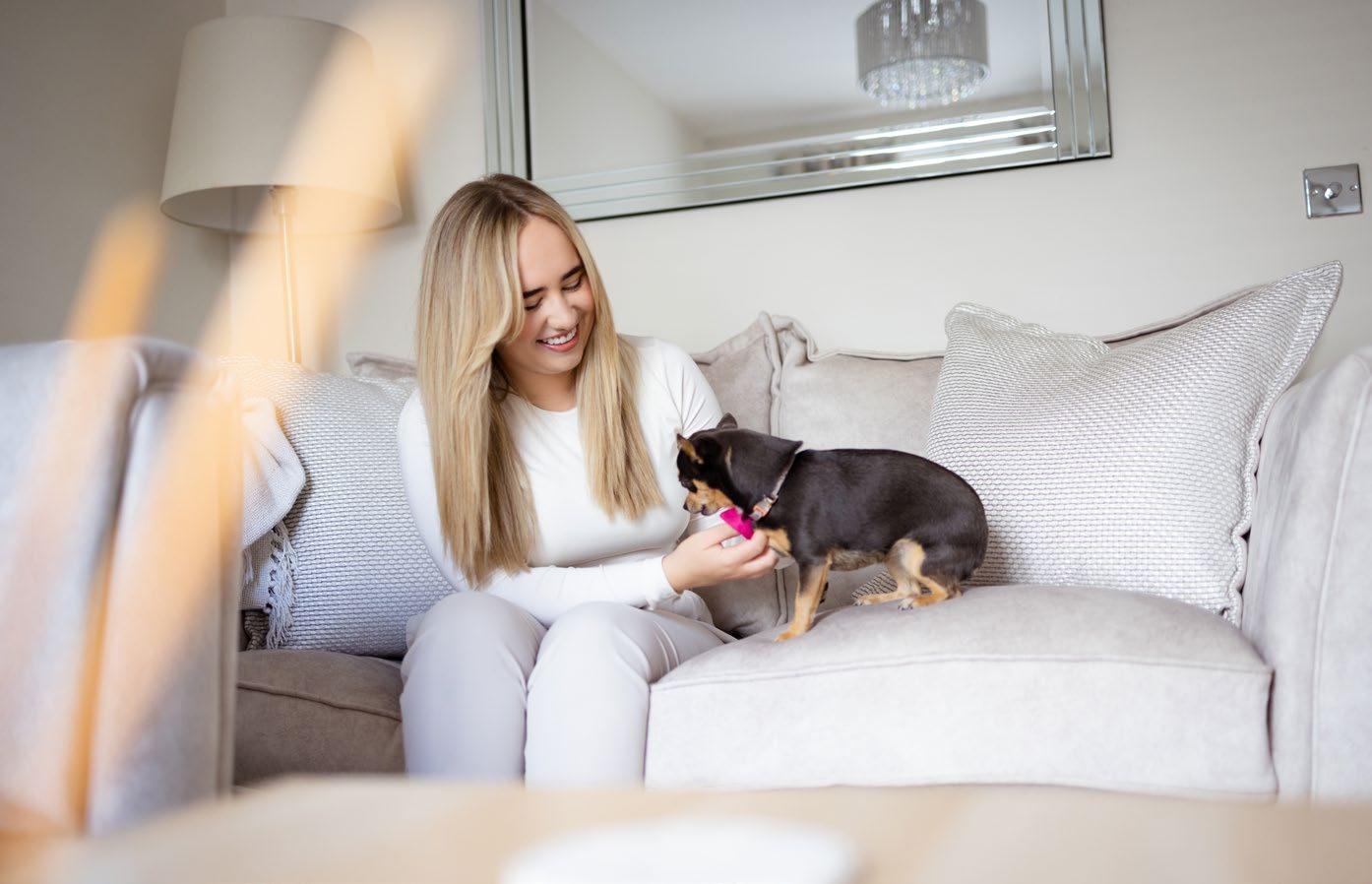

Fred and Pat Verrycke saw community nurse Wayne as ‘an angel coming up the path’.
Pat Verrycke recalls the day Mersey Care’s Urgent Community Response nurse Wayne Fleming knocked at the door of their Huyton home.
Her husband Fred, once a decorator to the Royal Family, had previously been taken to hospital after a 999 call. Now his wife was concerned that he was even more unwell and getting worse.
She clearly remembers the dilemma of what to do.
“I’d seen how busy the hospitals are but I knew we needed help.”
Pat called emergency services who promptly contacted her local Urgent Community Response Service, a team of community health professionals who assess and, where possible, treat people at home. If the person does need to go into hospital, they could avoid the A&E route.
In Fred’s case the community nurse who came to their home was Wayne.
“We saw Wayne walking up the path and it was like an angel had arrived to help us. We were so relieved to see him.”
Wayne gave Fred a thorough examination, diagnosed severe kidney infection and explained that Fred’s hospital records showed he’d had E-coli. He stayed with the couple to reassure them and prescribed medication for Fred’s condition.
Fred is now on his way back to good health and enjoying his beloved hobby of wood turning. Pat says they are both full of gratitude to the UCR service.
“Wayne arrived soon after we made the call. He was so thorough, we had complete confidence in him. We felt better knowing Fred was getting the right care without having to go to hospital.”
Fred Verrycke is back to good health and his beloved hobby of wood turning thanks to Mersey Care's Urgent Community Response service.

Wayne says the service lets nurses and other staff find out more about their patient.
“Being in someone’s home lets us see the whole picture. We have time to identify problems and hopefully resolve them in a way that avoids someone needing to go to A&E.”
“We felt better knowing Fred was getting the right care without having to go to
hospital.”
Urgent Community Response (UCR) is a rapid response assessment service for adults over 18 in need of urgent care. It aims to treat people in their own home within two hours of their call to avoid sending them to A&E if possible. Every neighbourhood has an urgent community response service.
The service is available 365 days a year, 8am to 8pm. You can be referred by your GP or any health or social care professional.
It’s your service – use it.
Huyton GP Paul Conway (below) uses the service regularly to help his patients avoid going to A&E. “It’s fantastic to be able to treat people in the comfort of their own home and to take pressure away from emergency services and hospitals. We all work together to keep people independent, comfortable and safe.”
He urges fellow GPs and the public to follow his lead. “It doesn’t matter where you live, every area has an urgent community response service and we should use it.”
Scan here to learn more about the service.

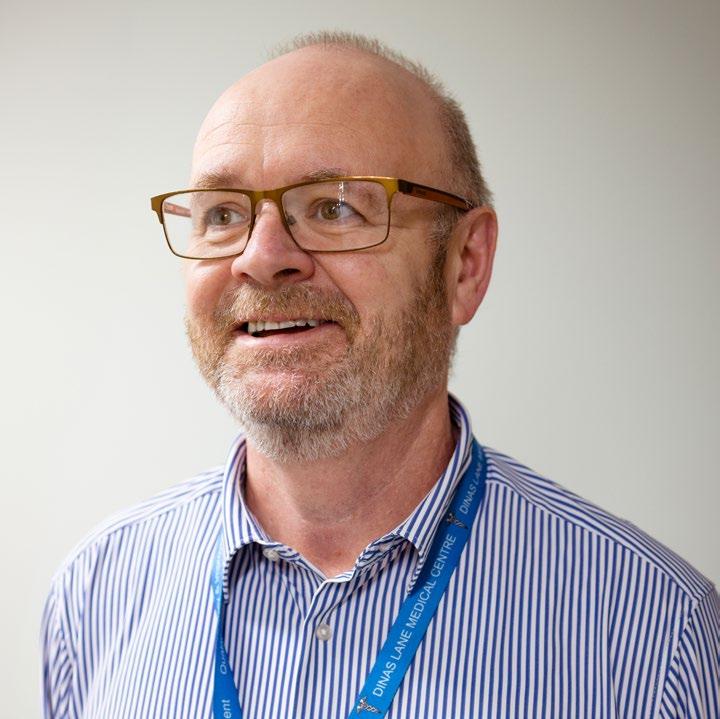
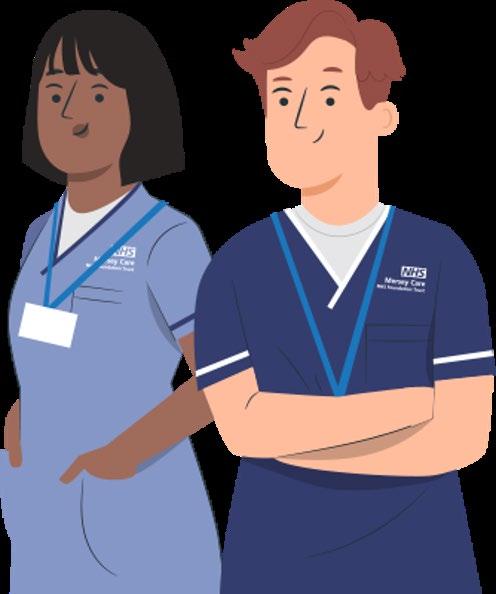

To celebrate Black History Month, Rachel Robinson talks to two women about their visions for the future.
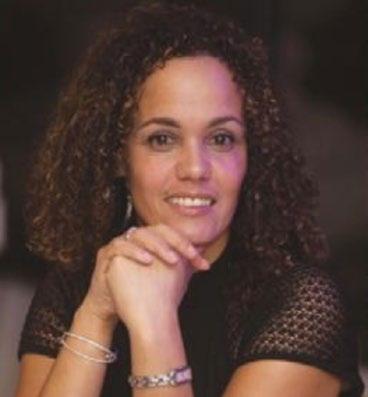
Nurse Justine Nakimuli recalls the day she came face to face with Nelson Mandela.
“He visited my school in Uganda. I sang in a choir and he shook my hand. I’ll never forget it.”
Now, as Freedom to Speak Up Guardian and Cultural Sensitivity Lead for Equality and Diversity, Justine feels Black History Month ensures we never forget black culture through time.
“Our rich contribution is marginalised. Black History Month is a chance to make sure it’s not erased.”
Justine came to England at 18, but not by choice. “I’d wanted to study accountancy but the British Government was offering incentives to Commonwealth countries. My strong minded mom said, ‘You’re going there to do mental health nursing’, so I did.”
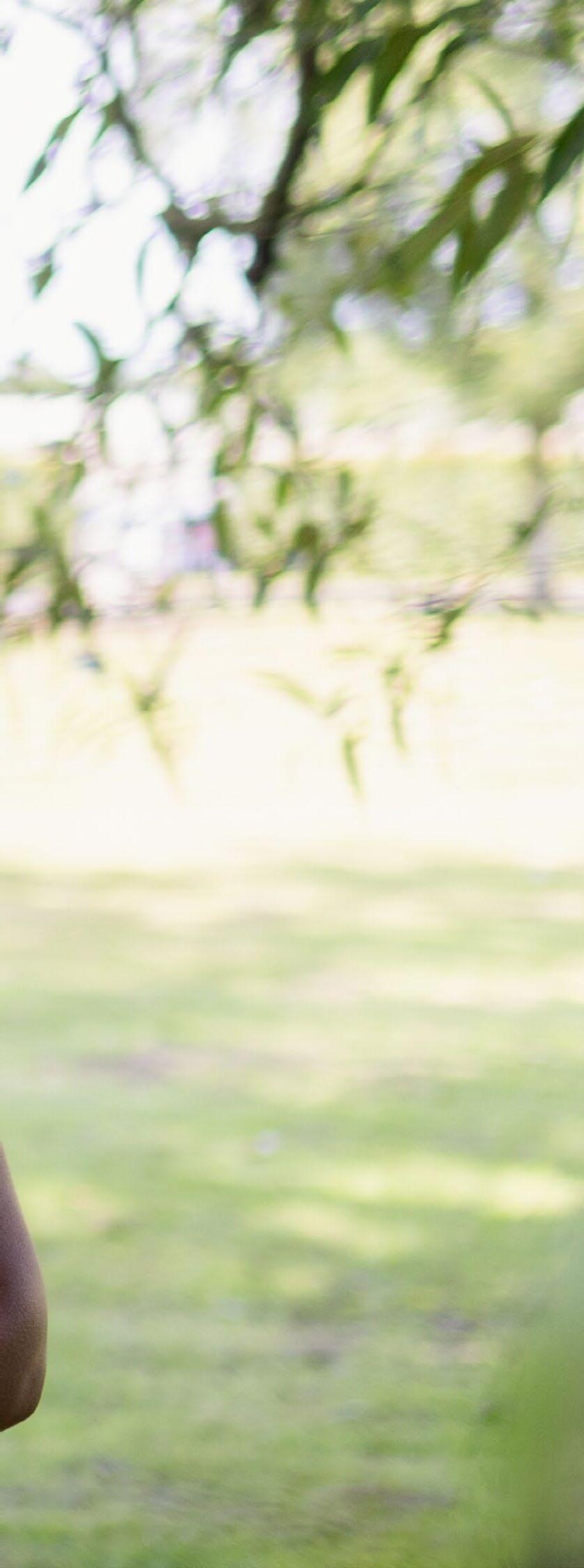
Justine Nakimuli says people like her hero Nelson Mandela (right) should be celebrated through time.
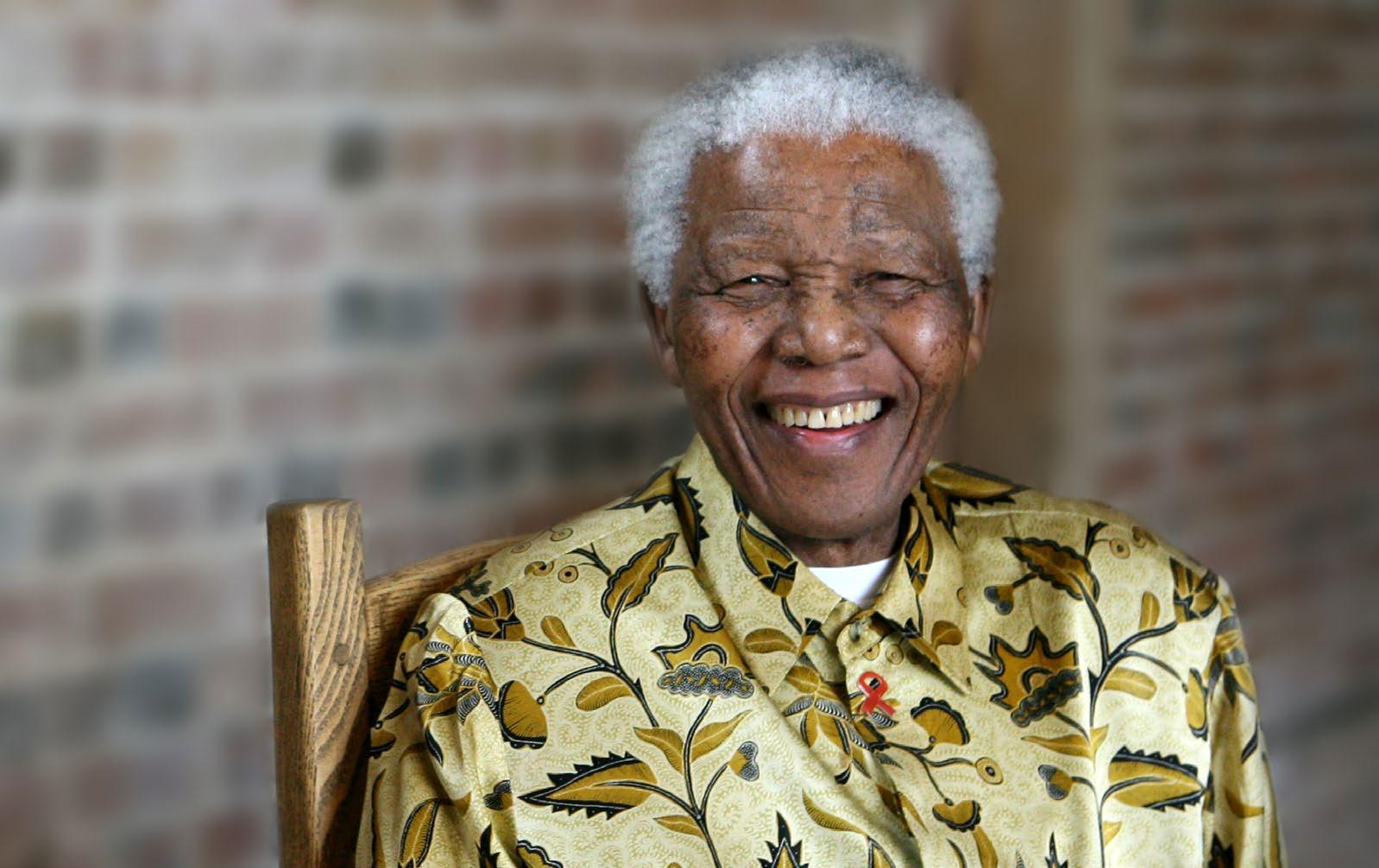
She worries her children’s generation won’t have the same sense of belonging.
“Uganda is my identity. It’s my home. But my development, my growth, my momentum has all been here. Back home my kids aren’t seen as Ugandan, here they’re not seen as British.
meaningful allies* now. Managers are more proactive in supporting staff. It’s involved difficult conversations but that’s how change comes about.
After rising through the NHS ranks in London, she relocated to St. Helens – it was a world away from what she knew.
“I was the only black staff member. I didn’t see a black patient for four years. My daughter was the only black child in her school, she’d come home and cry.”
Justine is President of the Ugandan Nurses Association and returns annually to support her village hospital.
“After the tragic incident in Southport my daughter said, ‘Mom, where is home’? It made me sad. I say, ‘You live in Britain and you’re part of this country, but you have an identity, a history. You have grass roots and once you’re grounded into that, you feel pride, you belong.”
Has much changed since last Black History Month?
“If I’m honest I’d heard some dark stories that made me angry. You don’t forget but you need to forgive otherwise it becomes a barrier to everything you do.
“I feel my role as a Guardian and Cultural Sensitivity Lead has been a driver in people feeling safer to speak out. There are more
”You have grass roots and once you’re grounded into that, you feel pride, you belong.”
“There are still people though who have never sat at a table with a black person. How can they understand that person’s journey? This year I hope we look at what we’ve shaped, the difference it’s made and build on that with training and policies that challenge, support and educate people. It’s a journey for us all, but I can see light at the end of the tunnel.”
*An ally is someone who gives their backing and voice to the movement towards equality for all.
Read Maureen’s story on page 28

Maureen Whilby, Non Executive Director with Mersey Care, wants people to ask questions about black history and culture.
“I’m from a big Caribbean family, so Black History Month is an important way for people like me to come together positively and safely, to share stories and talk about raising up changes we feel need to happen.
“It’s a reminder that black people have been here for a long time and is a chance to share the richness of our history. My own hero is Nanny of the Maroons, a Jamaican national hero. She was a superstar in the way she fought for and protected her people.
“We need to help people learn more than what’s in the echo chambers on social media and in the press. Please ask us questions – we’re a friendly, vocal bunch!”
Are you surprised to be the only woman of colour on Mersey Care’s Board?
“I’m not. In my career I’ve almost always been the only black woman at senior level. I’ve often thought, ‘Gosh, we’re in the 20th and 21st century and it’s still like this’.
“I really like the culture here, but we have limited resources, time and money. So I’ll be working alongside the Board of Directors to make sure everything we do aligns to what we want to change – and that includes equality, diversity and inclusion (EDI).
“I’ve been encouraged by the open mindedness and receptiveness from everyone at Mersey Care and there’s been a lot of good work done that deserves credit. However, it’s also fair to say the numbers don’t paint a story of consistent progress. Activities need to tie clearly into our strategic goals and be structured and funded.”
Will all this reach wards?
“It already does. But from my visits to hospitals, community hubs, The Life Rooms and conversations with international nurses, people are saying there’s more to do, especially on cascading information around objectives and progress. Staff don’t always have time to read emails. We need a better way to share progress.
“If our aspiration is to zero discrimination, we need to understand the barriers. If we can create the right structures to drive EDI, work better together, trust each other and measure the difference, I’ll be happy.
“I’m here to make sure everyone is part of this allyship. We’re moving the cultural mindset. My job is to help to keep the focus on EDI change which won’t happen overnight. It’s not a mandate it’s a movement.”


How do you talk to a child about their worries?
Going back to school after the summer break or moving house may be an anxious time for a child. Traumatic events like an accident, the death of a loved one, a burglary, a natural disaster or a terrorist attack can have a big impact on children, even if they weren’t directly involved.
It’s important to accept that a child’s behaviour may change while they deal with their thoughts. Remind them they’re safe and it’s okay to have strong thoughts and feelings about what’s happened.
You don’t need to have all the answers; being there and offering a safe space to talk is the important thing. School and your GP can advise how to seek further help.
For young people struggling with their mental health or thinking about suicide, free 24/7 support is available every day of the year.
Papyrus
www.papyrus-uk.org
Call: 0800 068 4141 Text: 88247
Email: pat@papyrus-uk.org
Shout
Text SHOUT to 85258
Childline
Childline.org.uk Call: 0800 1111
Samaritans
Call: 116 123 Samaritans.org
NHS Go - an app for young people age 16 to 25.
For more information and support for children and their parents, visit YoungMinds www.youngminds.org.uk
Parents Helpline 0808 802 5544. (Monday to Friday, 9.30am to 4pm).
Source: NHS England
Children of all ages can show trauma through:
• Nightmares or struggling to sleep
• Feeling anxious or jumpy
• Flashbacks and panic attacks
• Struggling to cope with everyday stresses
• Scared to leave family, or wanting to spend time alone
• Irritability
• Difficulty concentrating
• Feeling guilty or numb.
Help them by:
• Making sure they eat well and get a good night’s sleep
• Taking pressure off where you can. Does their room have to be tidy? Can they get time off homework?
• Getting back to doing things you used to do. Ask what will make it easier for them
• Keeping things around that make them feel safe – this could be a toy, a pet or a special person
• Encouraging them to talk to you about worries or write them down.
Autumn is a second spring when every leaf is a flower Albert Camus.

Autumn is a temporal landmark – something that changes how we see time. It makes us more motivated to take on new challenges and enjoy the bounty of the season. Our guide offers plenty of ways to enjoy your days.
As dark nights set in it’s easy to become a couch potato when in fact we should keep moving. The latest new sports are pickleball and padel. The USA born game of pickleball has been around since the 60s but it’s catching on here and can be played indoors or outside.
Originating in Mexico and a favourite of ex Liverpool manager Jurgen Klopp, padel is played indoors or outdoors at a faster pace than pickleball.
Both padel and pickleball can be played as singles or doubles matches so take your mates or go alone and make friends.

Game4Padel has three outdoor courts at Liverpool Cricket Club. You’ll pay for games but padels are free.
Amanda Vernon (pictured above right) played tennis but has taken up pickleball since developing osteoarthritis in her knees. She invited the UK director of Pickleball England, to run a taster session for her local Nifty Fifties group and the U3A group in Aughton, West Lancashire. It took off.
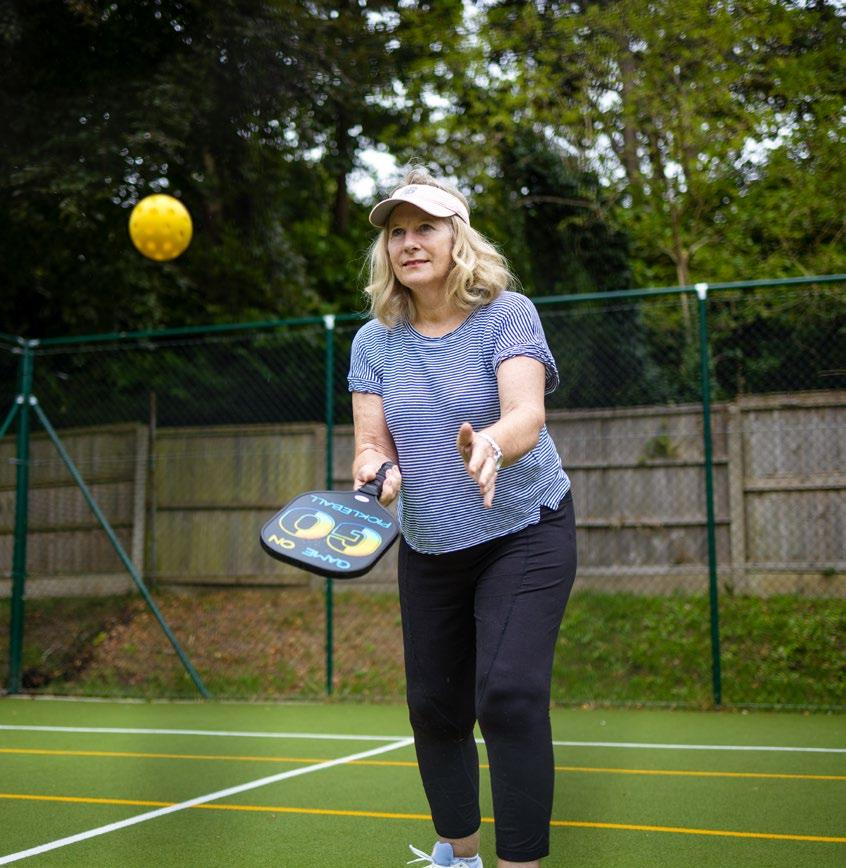
“Because it’s played with an aerated plastic ball it doesn’t seem to affect my body in the same way as tennis,” says Amanda.
“It’s really easy to pick up and there are pickleball festivals and clubs who mix together.”
• Visit pickleballengland.org and click on the Taster Session tab or the Club Locator page.
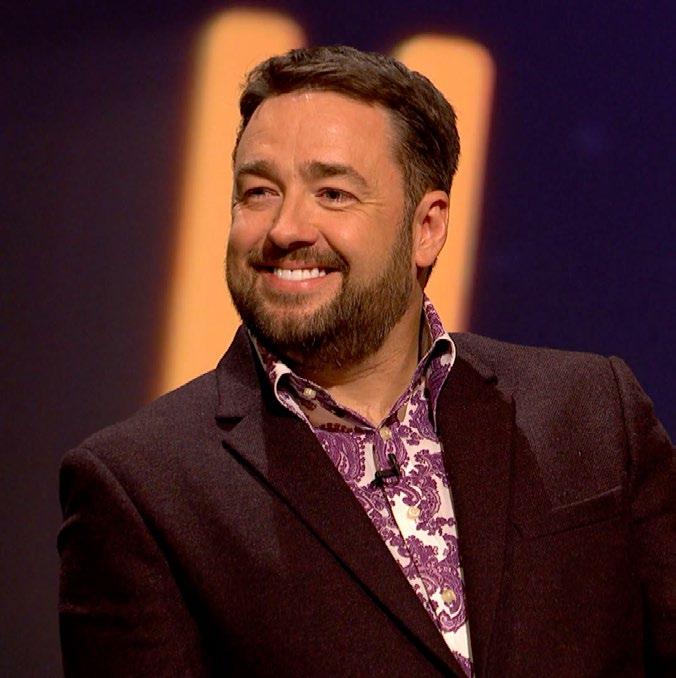
Celeb watch - comedian Jason Manford has launched a Facebook campaign to get schools involved in padel.
www.facebook.com/ JasonManford
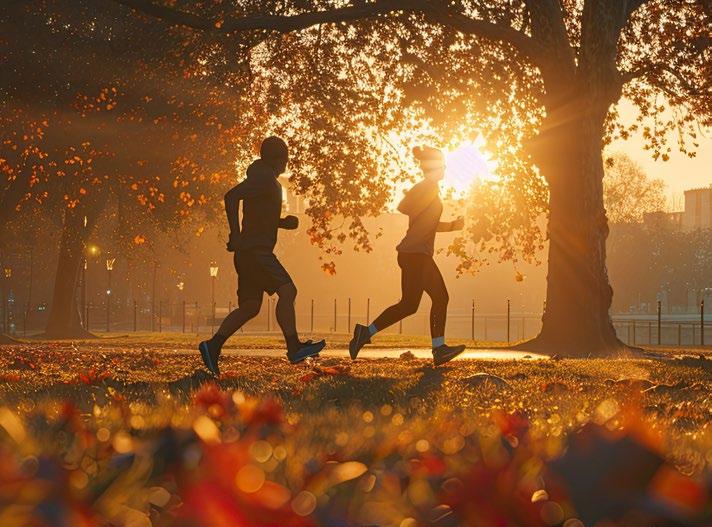
Download the Sport England Couch to 5K app in association with the BBC. Couch to 5K is a running plan for absolute beginners, developed by new runner Josh Clark to help his mum. The plan involves three runs a week with a day of rest in between, and a different schedule for each of the nine weeks. Visit: bbc.co.uk

Oktoberfest, Day of the Dead and Halloween will all be celebrated with events. Or create your own gathering with food to match the occasion.
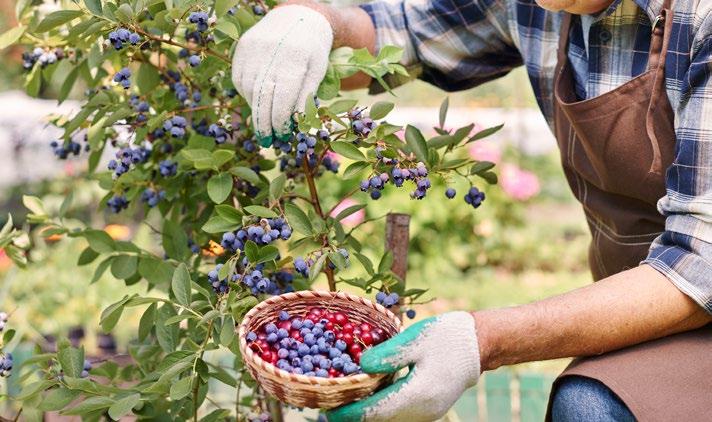
Go fruit picking, scavenger hunting or to visit an orchard day at your local nature reserve or farm. National Trust has events: nationaltrust.org.uk
Make informal displays with fallen leaves and wood. Pinterest has some great ideas and you don’t have to be an interior designer to bring the outside in. Visit: pinterest.co.uk

The Danish call it hygge and claim you can’t see it, only feel it. Curling up by candlelight in front of a fire with a hot drink and a book is as close as it gets. Swap books with friends or at your local supermarket or community centre.


Meet the stroke survivor praised by medics for his dogged determination to get well.
I was paralysed down one side. Now I travel miles on my scooter.

As a former lifeguard trainer, Andy McNicholas knew the signs of a stroke. Then one day it happened to him. Read how a team of experts and his own inner strength have worked their magic.
On Halloween last year Andy McNicholas went for a walk, took a nap – and had a stroke.
He recalls events. “I’d walked five miles, felt fine and went for a sleep. As I woke and tried to stand up, my leg felt numb and I fell over. I tried to get up but I couldn’t move. Then embarrassingly I lost control of my bladder. I knew the signs - I’d had a stroke.”
Andy’s initial panic was replaced by a need to get help, but he was paralysed down one side. He dragged himself to a phone and called an ambulance. Hospital staff worked swiftly to prevent potentially life threatening fatal blood clots and Mersey Care’s Early Supported Discharge Team
Rinta Yuvaraj, Early Supported Discharge Team Clinical Lead (right), praises Andy’s determination.
“Improvements in the brain happen quicker when we get quick, responsive, intensive therapy. Andy wanted to get well and worked closely with us, taking on suggestions but then researching for himself. He’s brave. He wants to get well. That’s his magic.”
worked with him for six months at home, providing physiotherapy, occupational and speech therapy.
Andy is open about mood slumps from losing his independence. But true to form he’s found a solution.
“I hadn’t realised how long getting my driving licence back would take. I love being in nature and being immobile was depressing. For the sake of my mental health, I bought a mobility scooter. Now I can go to parks and shops up to five miles away.”
He’s finally looking forward. “Although the therapy has been hard work and I’ve had setbacks, my positivity has improved tenfold.” Now that’s magic.

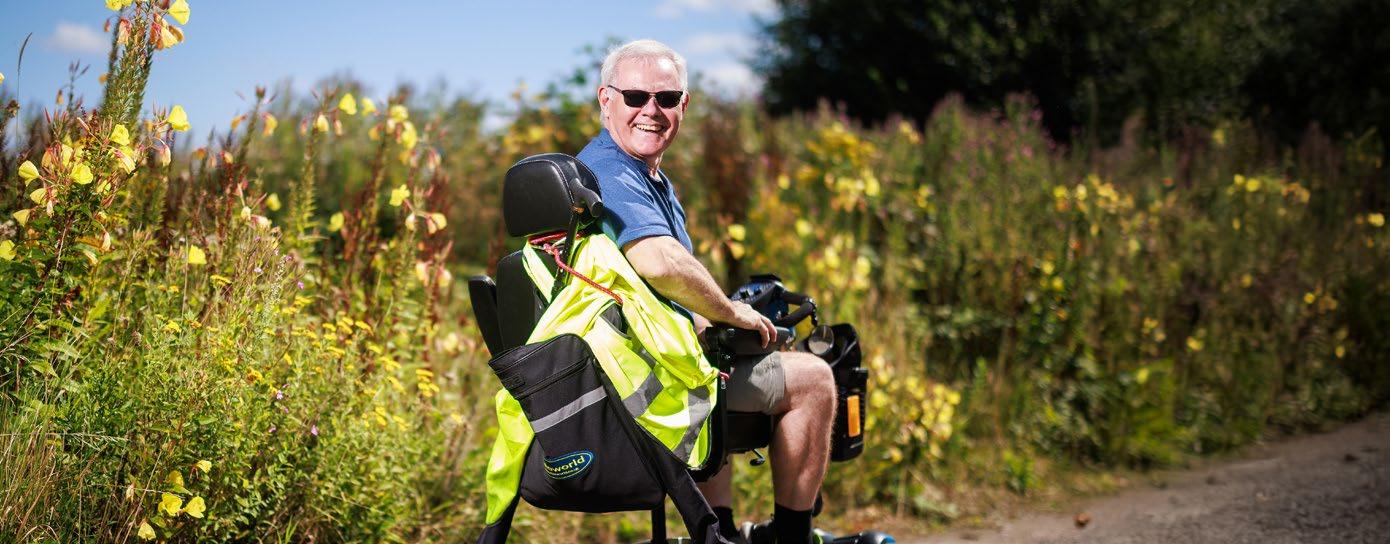
Being out and about in nature has helped Andy.

“Life often takes us in unexpected directions. I’ve always tried to embrace change and look for the positives. Whatever I’m doing my priority is always the people involved.
I enjoy being around people. I moved to Warrington in 2019 knowing hardly anyone, so when the pandemic came I felt a real sense of isolation.
When the world opened up I joined a Zumba class and met a group of ladies, who I now class as friends. The group is so inclusive – when someone joins they’re not the ‘newbie’ for long!
I took the chance to be a governor so I could become even more involved in my community. When I heard about the vacancy I thought, ‘I’m going to have a go at that’.
My working life has included 14 years with mental health charities, some at senior level. But I have personal experience too. Life events led to me becoming mentally unwell and it was only with fantastic support from my community mental health team that I recovered. I can understand and empathise with both staff and patients.
Karen Alcock, Public Governor
I sometimes doubt myself and worry I won’t be good enough, but I genuinely care about having good services. I understand the demands and challenges faced by staff as they strive to deliver high quality care too.
My goal as a governor is to use my life skills and professional expertise to help people be the best that they can be. I feel proud and privileged to be in a role where I can make a difference.
“I sometimes doubt myself and worry I won’t be good enough, but I genuinely care about having good services.”
Governor elections will take place early 2025. If you would like to find out more about what a governor role involves, please visit our website: merseycare.nhs.uk/about-us/council-governors
Find out more about our membership and governors at: merseycare.nhs.uk/about-us/council-governors
Tel: 0151 471 2303 Email: ft.membership@merseycare.nhs.uk Write to: Corporate Affairs, Mersey Care Trust Offices, First Floor Hollins Park House, Hollins Park, Hollins Lane, Winwick, Warrington, WA2 8WA
“Talk to someone who understands what you’re going through, They’re ready to listen.” Feeling anxious, stressed, down, sad, worried, panicky or depressed?
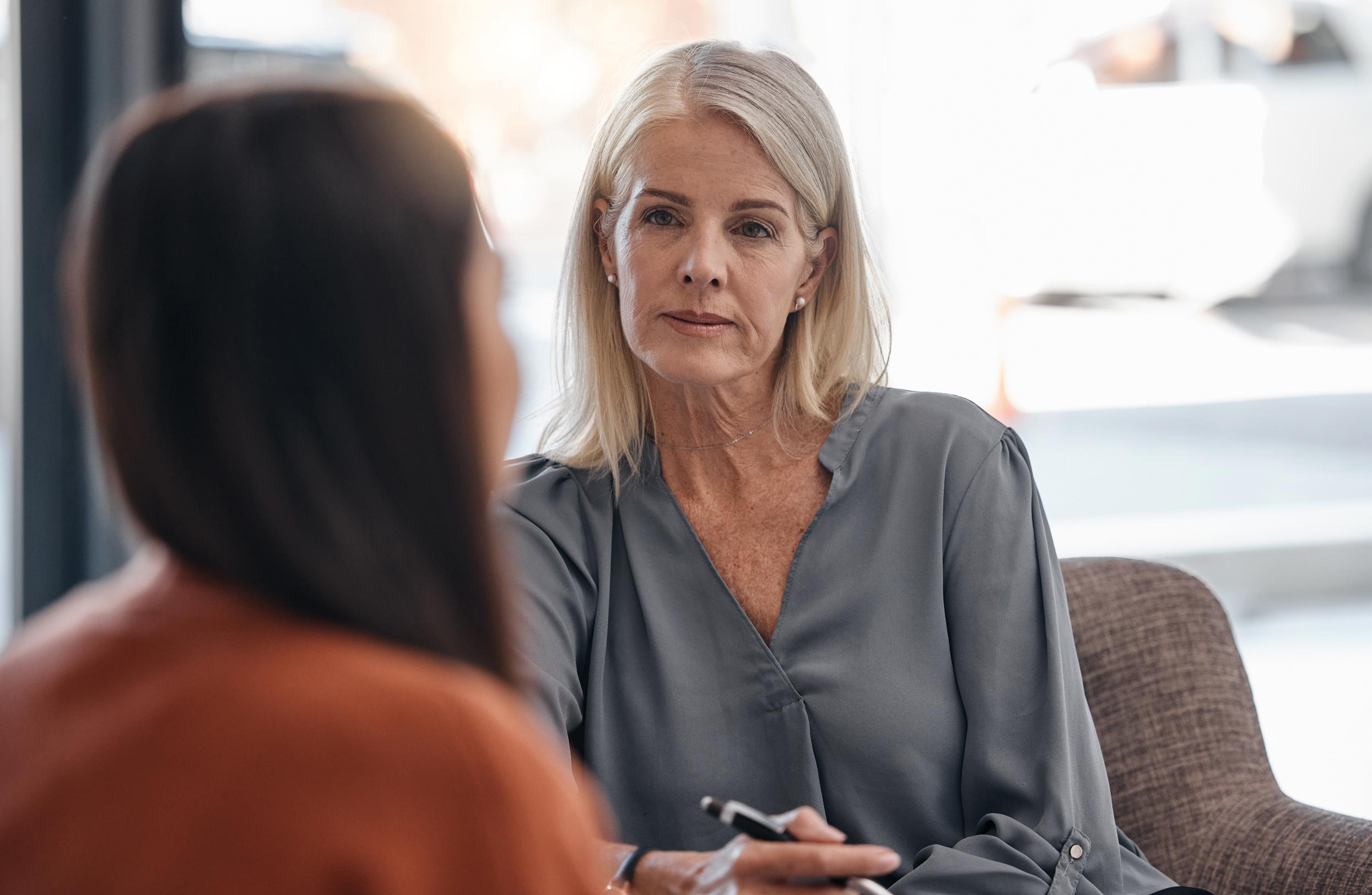

How to access our services
• Refer yourself online at merseycare.nhs.uk
• Refer yourself online at merseycare.nhs.uk
How to access our services
• Call one of our teams opposite
• Call one of our teams opposite
• For more information contact your GP
• Refer yourself online at merseycare.nhs.uk
How to access our services
How to access our services
• Refer yourself online at merseycare.nhs.uk
Halton Talking Therapies: 0151 292 6954
Liverpool Talking Therapies: 0151 228 2300
Liverpool Talking Therapies: 0151 228 2300
Knowsley Talking Therapies: 0151 351 8600
Knowsley Talking Therapies: 0151 351 8600
Halton Talking Therapies: 0151 292 6954
“Talk to someone who understands what you’re going through, They’re ready to listen.”
St Helens Talking Therapies: 01744 415 650
• Call one of our teams opposite
• Refer yourself online at merseycare.nhs.uk
• Call one of our teams opposite
• Call one of our teams opposite
• For more information contact your GP
• For more information contact your GP
St Helens Talking Therapies: 01744 415 650
• For more information contact your GP.
Feeling anxious, stressed, down, sad, worried, panicky or depressed?
Feeling anxious, stressed, down, sad, worried, panicky or depressed?
“Talk to someone who understands what you’re going through, They’re ready to listen.”
Liverpool Talking Therapies: 0151 228 2300
Knowsley Talking Therapies: 0151 351 8890
Halton Talking Therapies: 0151 292 6954
Halton Talking Therapies: 0151 292 6954
Liverpool Talking Therapies: 0151 228 2300
Liverpool Talking Therapies: 0151 228 2300
Knowsley Talking Therapies: 0151 351 8600
Knowsley Talking Therapies: 0151 351 8600
St Helens Talking Therapies: 01744 415 650
St Helens Talking Therapies: 01744 415 650
St Helens Talking Therapies: 01744 415 650




Visit www.merseycare.nhs.uk/HelpUsHelpYou

